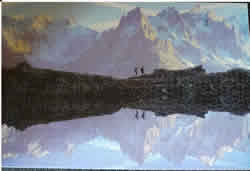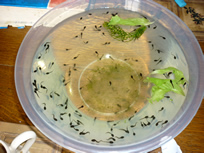
Tuesday 2nd March, white roofs blue sky, no commas yer. Second batch of spawn in the dead flag leaves, tightly pursed bundle of jelly, hope it's warmer inside there. To be moved from fish pool when small pool ice has melted.
Working as I do in a genre that has been assuming the imminent demise of printed fiction for decades, and expecting (with or without enthusiasm, depending whether you are an Orwellite or an Asimovian) total Panopticon culture maybe even longer, I don't know why I'm worried. I'll live in the unregulated chinks, for as long as they survive and same as I do right now. Much of my fiction/nonfiction is free online already & it gets distributed okay, or at anyrate better than I could expect from the Giant Nothing Evil Team.
However, the Google Book Settlement Resistance thing gathers momentum, run by people who are old fashioned enough to act as if they have a voice in the design of governance: and good for them. Here's Gill Spraggs' statement from the Google Books Breakfast last week: Discuss!
The Bookseller reported recently the government sees it as "right" that
the Publishers Association "leads" the UK's response to the Google
Settlement. I've been asked to point out that the rights that the
settlement would license to Google are rights to works created by
authors; rights that in a huge number of cases belong to authors;
publishers may hold licenses to them, but authors own the copyrights.
Many of the rights to out-of-print books have reverted to their authors.
Authors are very big stakeholders in this business; and many of us are
feeling that we are not being taken sufficiently into account. It is
authors who by their original creative work produce the value on which
the entire publishing industry depends.
In this country professional book authors who have looked into the
Google Settlement hate it. I am talking about authors who license their
books to trade publishers in return for an advance on royalties, and who
have built their careers wholly or partly round writing; authors who
sell books in large numbers, and authors who are hoping that their
latest book will break out into the big time. Witness the many UK names
on the opt-out list, an amazing range of talent that spans the genres,
the generations and the political spectrum. The debate among authors in
the run up to the opt-out deadline was focused on the best way to escape
from the thing: opt out, or opt in and remove your books. I know several
who have taken the latter course; anecdotally, I know there are others,
probably very many. Some are relying on promises from their publishers
to pull their books from Google's database. I can only find one
professional UK book author who has praised the settlement: Maureen
Duffy, Honorary President of ALCS and a representative plaintiff.
The Settlement has been a PR disaster for Google. Authors worldwide
write blogs that are read by fans, friends, family, and many wannabe
authors. In recent months, comments on forums and blogs have become
increasingly hostile to Google. This includes comments on news sites,
and even, remarkably, in geek strongholds like the famous Slashdot site.
Google claims that out-of-print books are of no economic value, and that
the settlement is the only way that authors can benefit from them.
Professional authors know this is nonsense. Winning an award; getting a
TV or movie deal; bringing out a new book in a series; writing in a
genre that comes into vogue, or on a theme that becomes topical; all
these things and more can 'breathe new life' into an author's
out-of-print backlist. Authors who believe their works have value, to
themselves, to publishers and to other entertainment media want deals
with advances and promotion, negotiated on the best terms that the
market for their works will bear. They are not impressed by the prospect
of being buried amid millions of books in some online bookstack. They do
not believe that mass-licensing arrangements for the benefit of content
aggregators is a way to run a healthy book industry, or make the
profession of authorship either economically tenable or creatively
appealing.
The Google Book Settlement is objectionable not just in its details -
though there are many objectionable things about it - but fundamentally,
in the way that copyright-owners are opted by default into a scheme for
reproducing, selling and sublicensing their works. I cannot put it
better than William Cavanaugh, the attorney who presented the case for
the US Department of Justice at the Fairness Hearing: he said that the
settlement 'essentially turn[s] copyright law on its head because it
eviscerates the requirement of prior approval from the copyright holder'.
Without prior approval, there is no copyright. Copyright is a right to
authorize reproduction.
Here's something else that Cavanaugh said: 'It is the right to control
one's work that creates the incentive to produce it.'
Every age gets the culture that it pays for: pays for in money, and pays
for in respect.
The market in e-books is taking off. If we let the market take its
course, then, a few years down the line, most in-copyright books of
value will be available, permanently, in e-editions. Given demand,
publishers, some of them specialists, will track down and negotiate with
the copyright-owners of those scarce but sought-after academic
monographs, those out-of-print novels whose authors still have a
following, and most of the rest of the misnamed 'lost books'.
Time enough after that to worry about the rest of the books, the
so-called orphans, and the books that nobody wants.
There is nothing new about reprint publishing. What is new is that the
web makes it possible to efficiently match the niche publication with
its readers, and the costs of keeping a digital work available are very
low.
We can have a diverse, innovative market in e-books or we can have a
Google monopoly. We can have a publishing environment in which authors
whose works are in demand will be properly paid, because there will be
competing outlets for their work. Or we can write RIP over literature
in the long forms: the novel, the memoir, trade-published non-fiction,
and Google Books shall be its mausoleum.
We don't need the Google Book Settlement: what we need is what we have,
a living culture, generating real value.
Get in touch with Gill, or join the author rights group, via the blog:
http://blog.authorsrights.org.uk/
-----------
The Digital Economy Bill sounds as if it also wants watching. The danger of losing copyright law is bad enough, but our Government (and I don't just mean the party in power, they are none of them to be trusted), thoroughly corrupted by the War On Terrorism, shouldn't be allowed
near anything that gives them further unregulated surveillance access.
--------
About three years ago (I think it was), I had a request from PS, would I write an introduction for Stephen Palmer's new novel? I think that would be okay, says I. Only I'd have to read the book before I could say yes definitely, wouldn't I? Send it along. Time passes, I'm not concerned, PS publishing is madly overstretched, they'll get round to sending me the script down the line. Eventually I forget the whole thing. Saturday morning last, packet arrives. It's the four colour printed ARC for Stephen Palmer's new novel. Uncorrected proofs,
introduction by Gwyneth Jones to follow; due out in June. Whoa! I think I'm introducing this book! Never mind, it wasn't very likely I'd turn Mr Palmer down, I've read Memory Seed and Muzzeinland, it's only March, I'll just do what I can
 Wednesday 24th March, very mild, cloud rising and clearing as the afternoon declines. Did I say, on that walk from Woodingdean to Lewes, I never saw so many sweet violets before. These, in the thumbnail, running all along the foot of an old wall by the Downs Hotel, unphased by busy road at their feet. The scent, a delicate blend of Parma sherbert and dog wee. . . presumably passing dogs either like the odour and give it their seal of approval, or else hate it and try to do everyone a good turn by providing their own Febreze.
Wednesday 24th March, very mild, cloud rising and clearing as the afternoon declines. Did I say, on that walk from Woodingdean to Lewes, I never saw so many sweet violets before. These, in the thumbnail, running all along the foot of an old wall by the Downs Hotel, unphased by busy road at their feet. The scent, a delicate blend of Parma sherbert and dog wee. . . presumably passing dogs either like the odour and give it their seal of approval, or else hate it and try to do everyone a good turn by providing their own Febreze.
 Tuesday 23rd March, low cloud and mist, cool. How quickly Spring catches up. Everything's changed since ten days ago. Such an epic winter it's been, I'm sorry to see it go, but I can never resist the spring.
Tuesday 23rd March, low cloud and mist, cool. How quickly Spring catches up. Everything's changed since ten days ago. Such an epic winter it's been, I'm sorry to see it go, but I can never resist the spring. Elizabeth, how kind of you to ask after the tadpoles. Here they are, getting on fine.
Elizabeth, how kind of you to ask after the tadpoles. Here they are, getting on fine.  Thursday 4th March, blue sky, bright sun, chill air but no ice or frost. This entry photo stars my cat Ginger, dressed in a table napkin. She's fond of dressing up. Napkins, newspapers, anything that could cover a cat. . .
Thursday 4th March, blue sky, bright sun, chill air but no ice or frost. This entry photo stars my cat Ginger, dressed in a table napkin. She's fond of dressing up. Napkins, newspapers, anything that could cover a cat. . . Tuesday 2nd March, white roofs blue sky, no commas yer. Second batch of spawn in the dead flag leaves, tightly pursed bundle of jelly, hope it's warmer inside there. To be moved from fish pool when small pool ice has melted.
Tuesday 2nd March, white roofs blue sky, no commas yer. Second batch of spawn in the dead flag leaves, tightly pursed bundle of jelly, hope it's warmer inside there. To be moved from fish pool when small pool ice has melted.